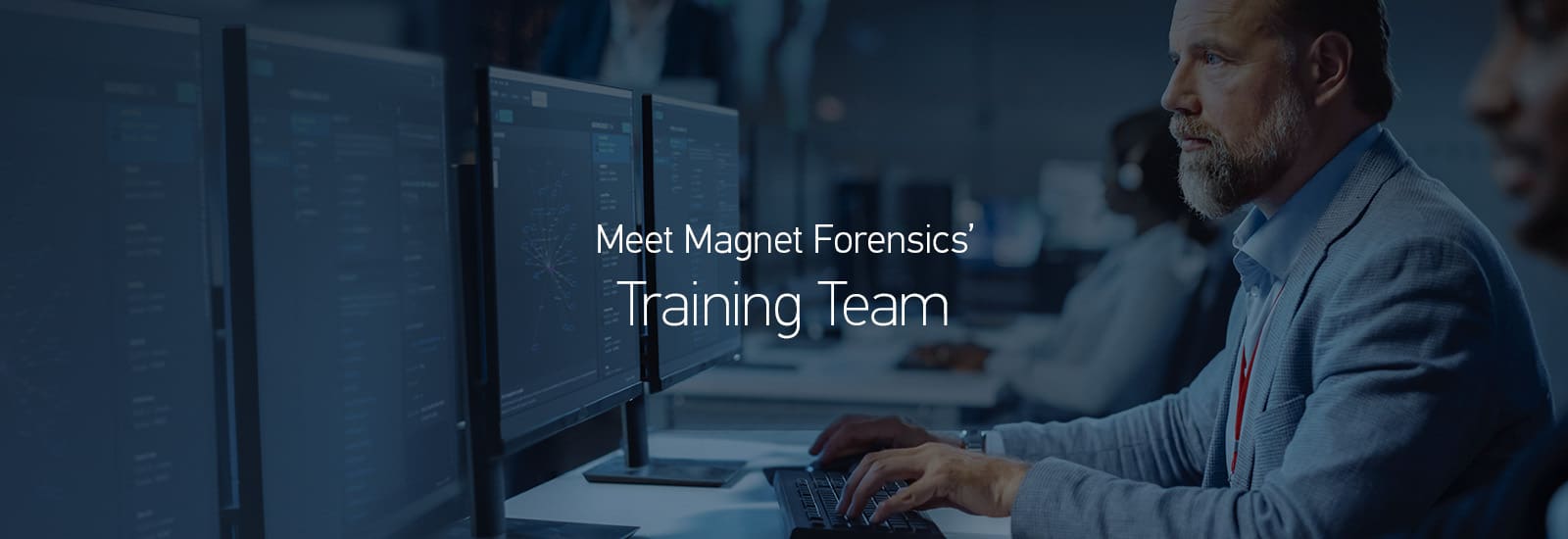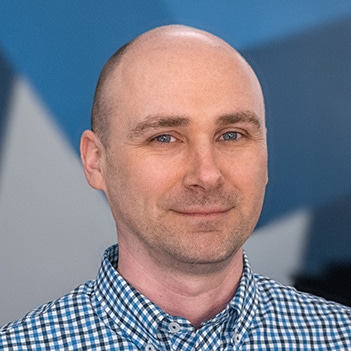
Meet Magnet Forensics’ Training Team: Chris Blight
 Introducing one of our newest Magnet Forensics Trainers, Chris Blight.
Introducing one of our newest Magnet Forensics Trainers, Chris Blight.
Chris comes to us from an extensive background in UK law enforcement and, as a trainer, enjoys passing on knowledge to others. Check out our interview with him below!
Want to learn more about what courses are offered? Visit our Training & Certification page for more information.
MF: Tell us about your life before becoming a Trainer.
CB: Before becoming a trainer at Magnet Forensics I spent nearly fifteen years working in law enforcement for South Wales Police, in the UK. My previous role was based at the Digital Forensics and Cyber Crime Unit, where I carried out digital forensic investigations in predominately child exploitation cases. I was also responsible for the IT infrastructure and estate for the department, so I was kept busy!
MF: What made you want to be a Trainer?
CB: After having worked digital forensic investigations for a number of years, and acted as a mentor to numerous investigators, I felt that I’d like to give back to the community in a different way. I always enjoyed passing knowledge on to others, and the opportunity to join Magnet, having been such a huge advocate of their tools, made it an easy decision to make!
MF: What type of training have you taken part in personally? What is your favorite part of the role?
CB: I’ve taken part in numerous training courses. I have certifications from the College of Policing, Guidance/EnCase, MSAB, CompTia, Microsoft, and of course, Magnet!
MF: What excites you the most about a new class?
CB: The most exciting part of any class is getting to meet examiners and investigators from various organisations across the world. It is fascinating to meet with individuals from all walks of life. It is interesting to learn the differences between various organisations, agencies and cultures; but what strikes me more, is the similarities between us.
MF: Do you ever learn anything from the students?
CB: I learn something from a student in every single class! Digital Forensics is such an expansive subject, and moves so quickly, that it’s simply impossible to know everything. As well as learning from the students, I think the students also learn a lot from each other. There is generally a wealth of experience and knowledge in every classroom.
MF: Is there a particular moment that stands out the most to you in your career in the classroom?
CB: I’ll never forget my first time teaching for Magnet, and walking into the National Computer Forensics Institute in Alabama. It was quite intimidating! The thing that stands out for me the most though, isn’t a specific moment as such: there are certain points where you relay a certain piece of information and instantly get feedback. I hear comments such as, “I had no idea it could do that!” during each and every class!
MF: What do students get out of training in person that they can’t get on their own?
CB: It’s the interaction. You hear the stories from the students, and the challenges they encounter, and you can really contextualise the material to suit their specific needs. I also engage in a lot of great conversations and answer a lot of questions around the lunch table and after class! The learning doesn’t begin and end in the classroom!
MF: How prepared do you feel students are to use Magnet Forensics products after taking the training course?
CB: The students will walk away from the class much more prepared than when they walked in. I had been using AXIOM Examine for many years as an investigator, and after my first Magnet course I was just staggered at how I’d been under-utilising AXIOM.
MF: What is most unique about Magnet Forensics’ approach to training?
CB: All of the training curriculum has been developed by a team with decades of examination and investigation experience between them. Every course, lesson and module is created with how it’s going to be applied to real cases, in mind. The majority of the team have spent years performing examinations and giving evidence in court, and have a real first-hand understanding of the needs, challenges and requirements of their students. All this knowledge and experience is brought into the classroom, and I’ve found the majority of students find it much easier to engage with those who’ve had to walk in their shoes, so to speak.
MF: Why do you think certification is important to examiners?
CB: Certification is really important. Not only do the students gain vital knowledge, but they gain credibility. This is so important when giving evidence.
MF: How do you manage to keep up on the latest trends in digital forensics?
CB: As well as keeping abreast of current trends through online publications, and of course through digital forensics forums such as forensicfocus; I also keep in touch with a number of law enforcement organisations to understand the challenges they’re experiencing and trends that appear to be emerging.
MF: What trends do you see coming down the pipeline in digital forensics?
CB: Over the years we’ve seen the move from predominately ‘deadbox’ examinations, to mobile devices, to the advent of IOT devices. Ultimately, I think the necessity to recover data from the Cloud is going to increase dramatically. Virtually every smartphone on the planet has data stored in cloud services, as well as SAAS (Software as a Service) become far more commonplace. I think this is an area that is currently worryingly overlooked during digital forensic investigations. This is surely going to increase with the advent of 5G.
Thank you, Chris! Welcome to the Training team and to Magnet Forensics overall—we look forward to seeing your future contributions.
Read our previous interviews with VP Training Chuck Cobb, Director of Training Operations Jamey Tubbs, Chris Vance, Patrick Beaver, Doug Estes, Lyn Goh, Larry McClain, Hoyt Harness, Chris Cone and Jerry Hewitt.
Click here to go to the Magnet Forensics Training and Certification Portal.
 Introducing one of our newest Magnet Forensics Trainers, Chris Blight.
Introducing one of our newest Magnet Forensics Trainers, Chris Blight.